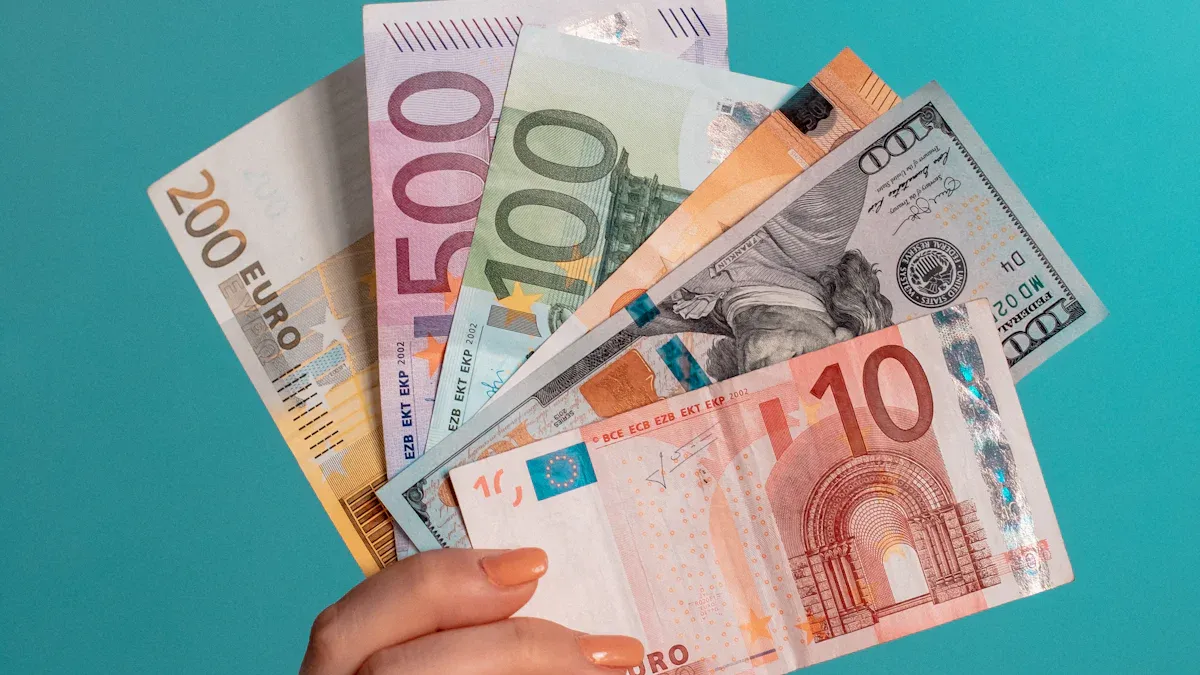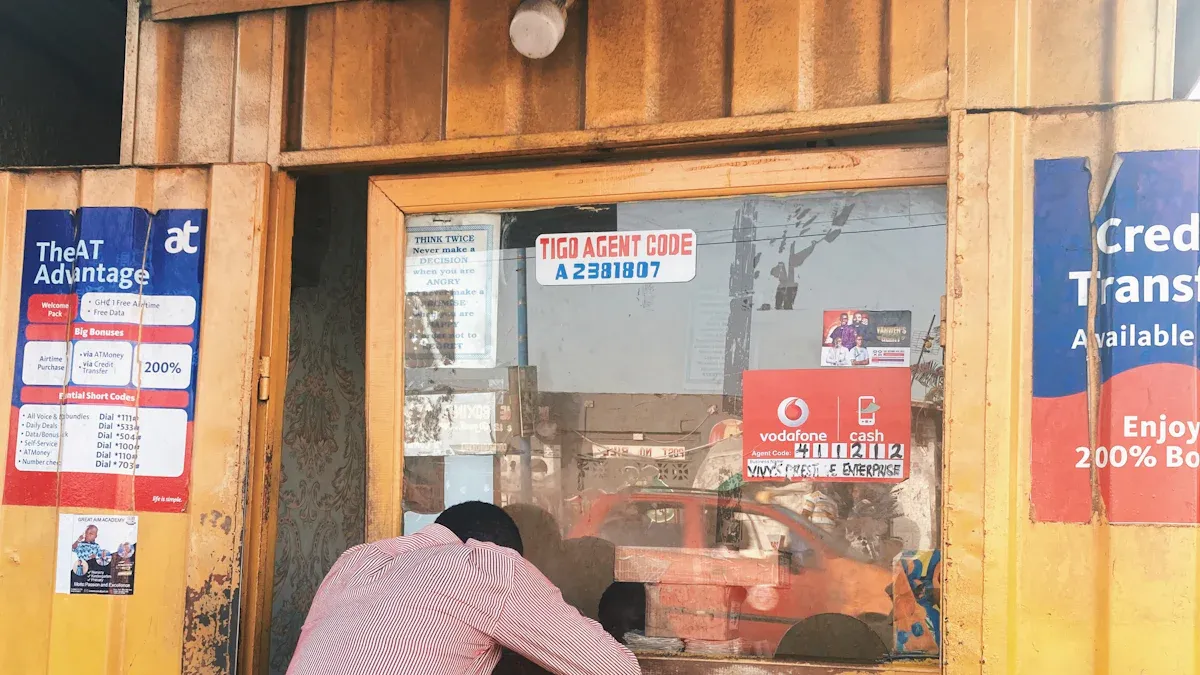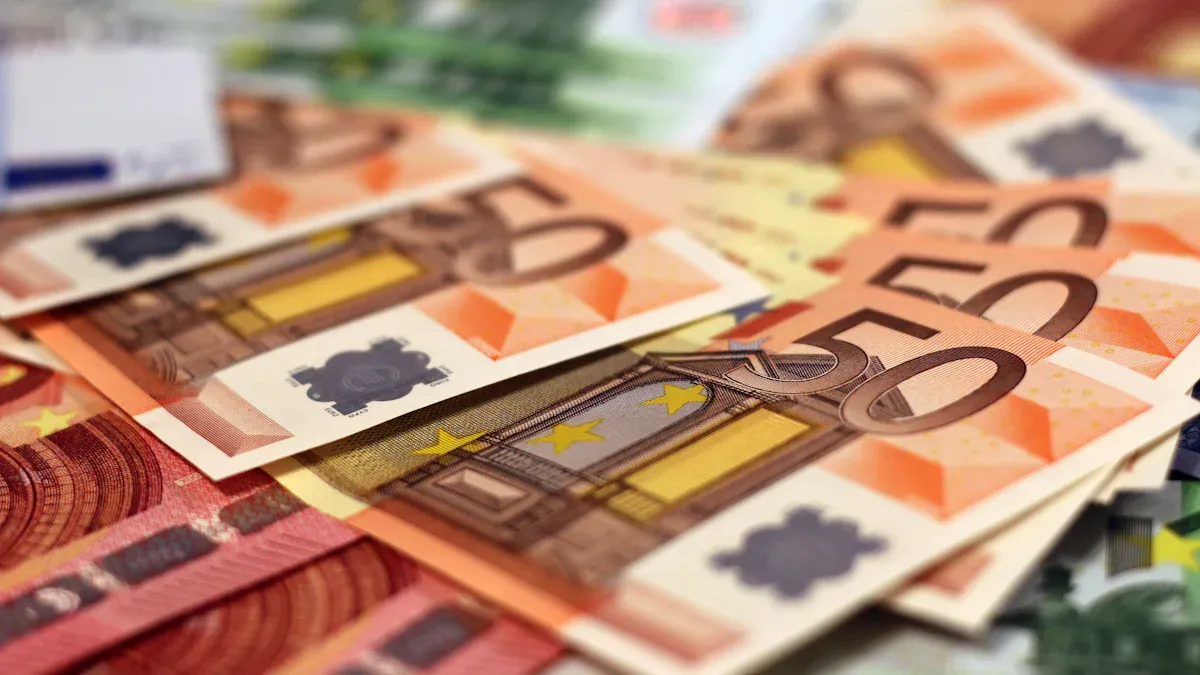- EasyCard
- Trade
- Help
- Announcement
- Academy
- SWIFT Code
- Iban Number
- Referral
- Customer Service
- Blog
- Creator
Analysis of the Most Cost-effective Method to Convert 400 US Dollars into Cedis

Image Source: unsplash
For exchanging a small amount of cash like 400 USD, the most cost-effective method is to find a licensed forex exchange bureau (Forex Bureau) in Ghana and exchange directly with cash.
This analysis of the most cost-effective method will help you understand its advantages, allowing you to safely and easily exchange for more Ghanaian cedis. You will learn how to make the wisest choice.
Key Points
- In Ghana, licensed forex exchange bureaus are the best places to exchange USD. They offer the best exchange rates.
- Carry large-denomination, clean 100 USD bills. This will get you a better exchange rate.
- When exchanging, be sure to count the money carefully. Remember to ask for a receipt.
- Do not exchange money on the street with strangers. It is unsafe and prone to counterfeit bills.
- When withdrawing from an ATM, choose to settle in local currency. This avoids unnecessary fees.
Best Option: Local Forex Exchange Bureau

Image Source: pexels
Choosing a licensed forex exchange bureau (Forex Bureau) in Ghana to exchange USD cash for cedis is the core of this analysis of the most cost-effective way to exchange 400 USD to Ghanaian cedis. You will find that this choice not only allows you to exchange more money but is also very straightforward to operate.
Exchange Rate Advantage
The core advantage of forex exchange bureaus lies in the exchange rate. Compared to airport exchange points and bank counters, the rates here are usually more favorable to you.
- Airport Exchange Points: They take advantage of travelers’ urgent need for money, with typically the worst rates.
- Banks: Rates are better than airports but still worse than specialized forex exchange bureaus.
Why is this? Forex exchange bureaus specialize in currency exchange, and the fierce competition between them allows you to enjoy better prices. For exchanging 400 USD, choosing a forex bureau may mean you can get dozens or even hundreds more cedis, enough to cover a delicious local dinner.
Transparent Fees
Many forex exchange bureaus advertise “zero commission” or “no fees”. You need to understand how this works.
Note:The real cost is hidden in the exchange rate At forex exchange bureaus in Ghana, you rarely encounter explicit “fees”. Services claiming “zero fees” usually include their profit in the offered exchange rate. This rate will be slightly below the global market mid-rate. Therefore, before exchanging, you should have a general idea of the day’s market rate.
Simply put, their quote is the final price you get, with no additional fees. This method is very transparent; you just need to compare the rate boards of different exchange bureaus to easily find the most cost-effective one.
Operation Guide
Finding and using a forex exchange bureau in Ghana is very simple. You can follow these steps to ensure a smooth transaction.
- Find Legitimate Exchange Points In Ghana’s capital Accra, the areas with the most concentrated forex exchange bureaus are the Osu district and major shopping centers. These places have intense competition, making it easier to find good rates. You can prioritize the following licensed and reputable exchange bureaus:
- Afriswap Bureau De Change: Authorized and regulated by the Bank of Ghana.
- Osu Branch Address: Osu, behind 17th Lane on Oxford Street, behind KFC.
- Forbes Forex Bureau:
- Address: Osu, 3rd Lane on Oxford Street.
- Qwick Bureau d’Change:
- Address: Osu, Cantonments Road (i.e., Oxford Street), opposite Barclays Bank.
- Yasole Forex Bureau:
- Address: Accra Mall, Tetteh Quarshie.
- Afriswap Bureau De Change: Authorized and regulated by the Bank of Ghana.
- Complete the Transaction Process
- Check the Rate: Upon entering, first check the USD (USD) buying rate (BUY) on the electronic display or price list.
- Present Cash: Hand your 400 USD cash to the staff.
- Confirm Amount: The staff will count your USD in front of you and calculate the total cedis you can exchange on a calculator. Please confirm this number.
- Count Cedis: After receiving the cedis, be sure to carefully count them again in front of the staff.
- Request Receipt: Finally, remember to ask for a transaction receipt as proof.
Transaction Notes
To make your exchange experience safer and more cost-effective, remember the following points:
| Notes | Detailed Explanation |
|---|---|
| Carry Large-Denomination USD | Carry clean, undamaged 100 USD denomination bills. Exchange bureaus usually offer better rates for large-denomination bills than small ones (like 20 USD). |
| Confirm Business License | Choose bureaus displaying a business license issued by the Bank of Ghana. For example, Afriswap is explicitly licensed and regulated by the Bank of Ghana, providing you with security. |
| Pay Attention to Transaction Safety | Do not conduct private exchanges with strangers on the street; the risk is extremely high. After completing the transaction at the bureau, keep cash secure and do not display it in public. |
Following these simple guidelines, you can easily and safely complete the exchange, starting your Ghana trip on a good note.
Other Exchange Methods: Analysis of the Most Cost-Effective Way

Image Source: pexels
Although forex exchange bureaus are the best choice, understanding other methods allows you to make flexible judgments in different situations. This analysis of the most cost-effective way will analyze the pros and cons of banks, airports, ATMs, and international remittances.
Bank Counter Exchange
Going to a bank to exchange money is a very safe choice. Major banks in Ghana, such as Ecobank or GCB Bank, offer foreign exchange services. However, bank rates are usually not as good as specialized forex exchange bureaus.
Banks profit from the spread between buying and selling rates. For example, below is a rate board once published by Ecobank; you can see the USD buying rate (the price the bank buys USD from you) is 10.5000.
| Currency | Buying Rate | Selling Rate |
|---|---|---|
| USD | 10.5000 | 10.9000 |
| GBP | 14.0500 | 14.6000 |
| EUR | 12.2000 | 12.7000 |
Operation Reminder Banks have limited business hours, especially on weekends. Many branches do not operate on Saturdays, so you need to plan your time in advance.
Airport Exchange Points
Airport exchange points are very convenient; you can exchange money right after landing. But the cost of this convenience is extremely poor rates. Airport exchange points are the most expensive among all options.
Some services claim online booking and airport pickup, but you still need to note their actual business hours. For example, Afriswap’s Airport City branch is closed on Sundays. If you arrive late at night or on weekends, these points may be closed. It is recommended to exchange only a small amount at the airport, enough for taxi fare and emergencies.
ATM Withdrawal
Using an international withdrawal-enabled bank card to withdraw cedis directly from an ATM is another excellent choice. ATM rates are usually very close to the market real-time rate, quite competitive.
- Advantages: Good rates, available 24/7, widespread in cities.
- Disadvantages: Your issuing bank and the local ATM’s bank may charge fees.
Before departing, be sure to confirm your issuing bank’s overseas withdrawal fee policy. Choosing a card with low global withdrawal fees can make this method more cost-effective.
International Remittance Services
You can also consider using Western Union or online remittance platforms to send USD to yourself and collect cedis at an agent in Ghana.
This method is more suitable for large transfers or sending to others. For 400 USD in travel funds, the fees may be higher, and finding a designated agent for pickup is less convenient than using an ATM directly. Therefore, this is not a recommended option in this analysis of the most cost-effective way to exchange 400 USD to Ghanaian cedis.
Practical Checklist and Pitfall Avoidance Guide
After mastering the exchange methods, this practical checklist will help you complete the exchange smoothly and avoid unnecessary losses. This analysis of the most cost-effective way will ensure every step is safe and efficient.
Pre-Exchange Preparation
Preparing well before departure can make your exchange process twice as effective with half the effort.
- Prepare Large-Denomination USD: Carry clean, undamaged 100 USD denomination bills. Forex bureaus usually offer better rates for large-denomination bills.
- Understand Approximate Budget: Plan your expenses in Ghana in advance and exchange only what you need.
- Prepare ID: Although not always required for small exchanges, carrying a passport copy is always a good habit.
Real-Time Exchange Rate Query
Before exchanging, you need to know the day’s market rate to judge if the quote is reasonable.
Core Reference:Market Mid-Rate The exchange rate you find online is usually the “market mid-rate,” the benchmark for interbank transactions. Although you cannot get this rate directly, it helps you judge if the forex bureau’s rate is fair.
You can use apps or websites like Xe to query real-time rates. They provide currency converters and rate alerts, making it easy to track the latest USD to cedi dynamics.
Safe Exchange Points
Ensuring fund safety is the top priority in the exchange process.
- Personal Safety: Choose well-lit, legitimate exchange bureaus for transactions. After exchanging, do not count or display large amounts of cash in public. Split cash storage and only carry the day’s needed amount when going out.
- Check Bill Authenticity: After receiving cedis, simply inspect the bills. Genuine notes usually have clearwatermarks and unique serial numbers as anti-counterfeit features. You can simply compare received notes with known genuine ones.
Identify Common Traps
Understanding and avoiding the following common traps can save you a lot of money.
- Stay Away from Street Black Markets:The Bank of Ghana has explicitly prohibited unauthorized foreign exchange transactions. Do not exchange with strangers on the street; it is not only illegal but also highly prone to counterfeit bills or scams.
- Beware of Dynamic Currency Conversion (DCC): When withdrawing from an ATM or paying by card, the machine may ask: “Settle in USD?”
Remember: Always choose to settle in local currency (GHS)! Choosing USD settlement triggers DCC. This means the merchant or ATM will use a very unfavorable rate for conversion, making you pay more fees.
Now, you have mastered the most cost-effective way to exchange 400 USD. Remember these two core recommendations:
- Primary Option: Find a licensed forex exchange bureau (Forex Bureau) in Ghana for cash exchange. This is your choice for the best rate and lowest fees.
- Backup Option: If you cannot find a suitable bureau, using a bank card with low global withdrawal fees at an ATM is your next best choice.
Hope this guide helps you make wise decisions. Wishing you a smooth and enjoyable trip in Ghana!
FAQ
What style of USD cash should I bring?
You should carry new, undamaged 100 USD large-denomination bills. Forex bureaus offer the best rates for such bills. Avoid old, creased, or soiled notes; they may be rejected.
What is the minimum or maximum I can exchange at once?
For small amounts like 400 USD, there are usually no limits. If exchanging thousands of USD in large amounts, forex bureaus may require ID like a passport.
If I arrive on a weekend or at night, where should I exchange money?
Most forex bureaus are closed on weekends or at night. Your best choice is to withdraw a small amount of cedis for emergencies from an airport ATM using your bank card. This is enough for transportation until bureaus open.
What to do with unused cedis when leaving Ghana?
Before departure, you can exchange remaining cedis back to USD at airport forex bureaus.
Please Note The rate for exchanging cedis back to USD is usually not favorable. You can also keep small bills or coins as unique travel souvenirs.
*This article is provided for general information purposes and does not constitute legal, tax or other professional advice from BiyaPay or its subsidiaries and its affiliates, and it is not intended as a substitute for obtaining advice from a financial advisor or any other professional.
We make no representations, warranties or warranties, express or implied, as to the accuracy, completeness or timeliness of the contents of this publication.




Contact Us
Company and Team
BiyaPay Products
Customer Services
is a broker-dealer registered with the U.S. Securities and Exchange Commission (SEC) (No.: 802-127417), member of the Financial Industry Regulatory Authority (FINRA) (CRD: 325027), member of the Securities Investor Protection Corporation (SIPC), and regulated by FINRA and SEC.
registered with the US Financial Crimes Enforcement Network (FinCEN), as a Money Services Business (MSB), registration number: 31000218637349, and regulated by FinCEN.
registered as Financial Service Provider (FSP number: FSP1007221) in New Zealand, and is a member of the Financial Dispute Resolution Scheme, a New Zealand independent dispute resolution service provider.




















